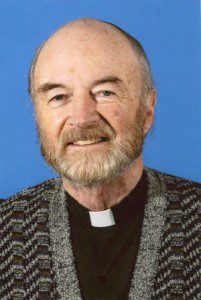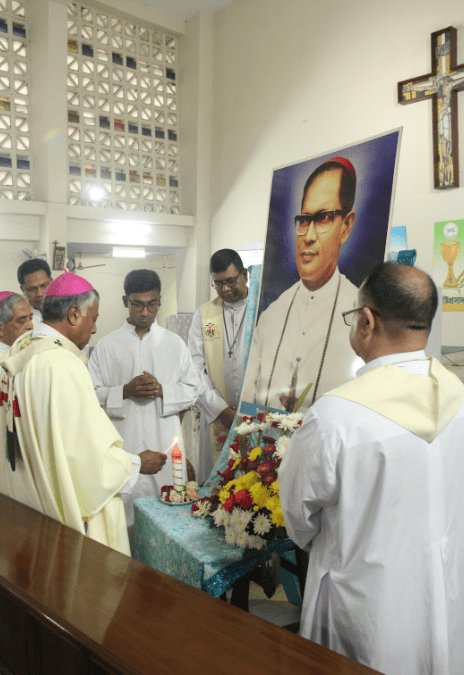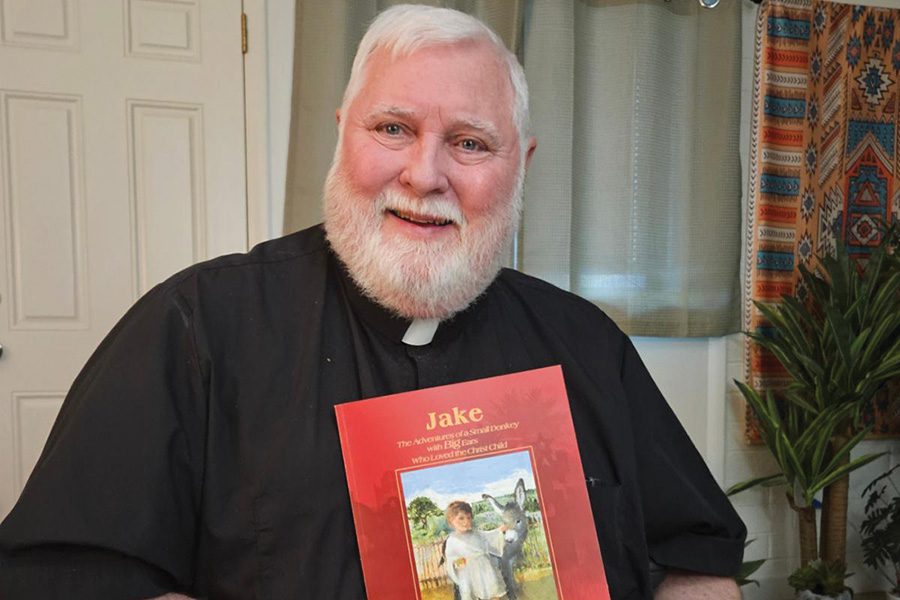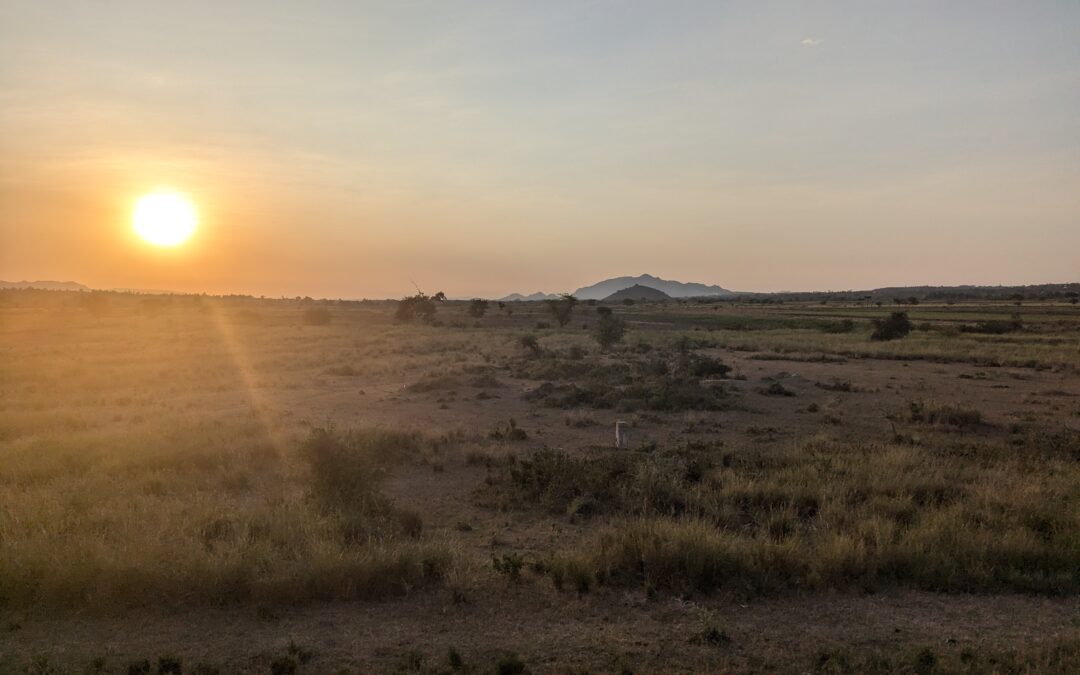 Click hereto read the Eulogy and Homily andview the Wake and Funeral Mass
Click hereto read the Eulogy and Homily andview the Wake and Funeral Mass
Rev. John Scribner Dunne, C.S.C., 83, died Monday (Nov. 11, 2013) at Holy Cross House.
Fr. Dunne was born on Dec. 3, 1929, to John Scribner and Dorothy (Vaughn) Dunne in Waco, Texas. He attended St. Edward’s Academy on the campus of St. Edward’s University, Austin, Texas, from 1943 to 1945, and then moved to Holy Cross Minor Seminary at the University of Notre Dame (Ind.) for his senior year of high school. Fr. Dunne was received into the Congregation of Holy Cross on Aug. 15, 1946, and made his First Vows on Aug. 16, 1947. He studied philosophy at the University of Notre Dame, where he graduated in 1951. Fr. Dunne made his Final Profession of Vows on Aug. 16, 1951, and was ordained to the priesthood on Dec. 18, 1954, in Rome. He earned an S.T.L. in Sacred Doctrine in 1955 and an S.T.D. in 1958, both from the Gregorian University in Rome.
Fr. Dunne returned to Notre Dame in 1957, where he began teaching and prefecting. He studied at Princeton University from 1960 to 1961, and also served as a chaplain at Our Lady of Princeton. He returned to Notre Dame to teach from 1961 to 1967. He taught at Moreau Seminary on the campus of Notre Dame from 1969 to 1970 and then again at Notre Dame from 1970 to 1972. Fr. Dunne was a visiting professor at Yale University from 1972 to 1973 before coming back to Notre Dame to teach from 1973 to 2013. He spent several sabbatical years at the Holy Cross Center, Berkeley, Calif., throughout his tenure at Notre Dame. Fr. Dunne was the John A. O’Brien Professor of Catholic Theology at Notre Dame. He published numerous books and received several awards from the University, including the 2013 Presidential Award, the Sheedy Award and the Danforth Foundation Harbison Award. He is credited by the Notre Dame Theology Department as having taught more students than anyone else in the University’s history. In 1999, Fr. Dunne was named as one of the most influential spiritual writers of the 20th century. Fr. Dunne also received a first-place award for his book, “Eternal Consciousness,” from the Catholic Press Association in June 2013.
Fr. Dunne’s parents are deceased. He is survived by his sister, Carrin Mary Dunne; brother Patrick (Margaret) Dunne; nephews, James Michael Dunne and John (Rebecca) Dunne; and great-niece and -nephew, Catherine and Nolan.
Visitation will be 3:30 to 7 p.m. Thursday (Nov. 14, 2013) at the Basilica of the Sacred Heart at the University of Notre Dame. Visitation will be in the Lady Chapel. The Wake Service will be held in the nave at 7:30 p.m. The Funeral Mass will be 3:30 p.m. Friday (Nov. 15, 2013) at the Basilica with committal immediately following at the Holy Cross community cemetery on the campus of Notre Dame. Kaniewski Funeral Home is handling the funeral arrangements.
Memorial contributions in support of the mission and ministries of the Congregation of Holy Cross can be made to: United States Province of Priests and Brothers, Office of Development, P.O. Box 765, Notre Dame, IN 46556-0765 or online atdonate.holycrossusa.org.
Wake Eulogy by Rev. Paul Kollman, C.S.C.
Nov. 14, 2013
John Dunne once became angry with me. I know, it’s surprising! I was questioning him with impertinent questions typical of young and callow theologians like, “What is the basis for this assertion? How does this claim fit in with other claims made by you and others?” All of the sudden, he grimaced and I was caught off-guard by the flash of temper something most definitely out of character! Looking at me closely, he said, with obvious frustration, “Paul, you are trying to understand what I say as an argument. Arguments! Who was ever convinced by argument? Be led by insights, not arguments.”
Insights not arguments. John was very good at very important things (he was not very good at some other things, like clothing himself) but good at important things like friendship (hence all of us here and the stream of visitors over the past months) and the generation of insights. And John lavished us with insightsinsights we treasured, prayed over, shared with friends, insights we let simmer in our own hearts and minds. Insight after insight after insight, a cornucopia given in classrooms and lectures and homilies, filling many books.
Where did they come from? John’s insights came because God enlightened his mind, and kindled his heart. We can be grateful when God does that in someone like John, and in ourselves. Worth noting here, as we celebrate his life a life too short, even though pretty long is how fully John welcomed and fostered such God-bestowed insights by his pattern of life. For what a remarkably disciplined pattern it was! Whether in northern Indiana or northern California or wherever he wandered, John prayed, wrote, ate, recreated with formidable regularity. Each day one paragraph of writing, done before noon, and the transcription of the paragraph from the day before into his computer. Perhaps teaching or reading nearly always something he’d read or taught before. Lunch in regular spots years ago at the Cornucopia in downtown South Bend, in Berkeley at the Musical Offering, at Corby Hall. Evening meals at Corby Hall, a few days per week with friends at regular restaurants.
Many of us are instinctively wary of such near obsessive routines. Yet our friend John followed the view of Friedrich Nietzsche, who praised such a life:
“What is essential ‘in heaven and on earth,'” Nietzsche wrote, “seems to be . . . that there should beobedienceover a long period of time and in asingledirection: given that, something always develops, and has developed, for whose sake it is worthwhile to live on earth; for example, virtue, art, music, dance, reason, spiritualitysomething transfiguring, subtle, mad, and divine.” (Beyond Good and Evil).
Long obedience in the same direction. I think it’s as good a description of John’s life as I can imagine. And John’s “long obedience in the same direction” yielded much that was transfiguring, that spoke to us of the subtle and the divine. John was obedient to his routines, allowing him to be obedient for a long time to God’s voice, God’s self-revealing. John developed over decades a deep correspondence between the Christian (and broader human) record a vast compendium of literature and references and thinkers, art and music and the fruit of his prayerful reflection on the very particular dynamics of his own mind and heart. This was the source of his insights: From God, through his life, for us. Over time, John’s own “journey with God in time” could speak powerfully to our journeys with God in time.
John’s obedient attentiveness to God and to the very particular details of his personal life meant an unblinking, courageous encounter with life in all its fullness. John did not shirk from the agonies that belong to being mortal and embodied and uncertain. Because he was so attentive and articulate, so long obedient in the same direction, his very personal striving for faithfulness before his mortality, his embodiment, and his uncertainty could teach us all. Because he was so focused, John’s longing for life amid piercing awareness of death resonated with us. Because he was so attentive, John’s pursuit of love shaped by loneliness echoed in our hearts. Because he was so alert, John’s discernment of light despite deep darkness illumined our own wandering journeys.
I have so appreciated that John in his personal and theological pursuits moved to frontiers to death and loving (especially as a celibate person) and other religions and other cultures, poverty and violence, and math and science and music frontiers where the divine presence is too rarely pursued and discerned. John knew God would be there and trusted to find God there. And find God he did, bringing insights to us.
For one such insight, let’s consider the Gospel we just heard: Jesus’ appearance to Mary Magdalene after the resurrection in John’s Gospel one of John’s favorites in recent years. How to understand Jesus of Nazareth, the only begotten Son of God, long preoccupied John. Once, after John had written an article about Jesus, he was walking down the street in Berkeley and another theologian cried from across the way, “Lower your Christology” an unusual cry in streets that have many unusual sounds! The theologian found John’s way to talk about Jesus to be too exalted, not human enough.
John used to say that there were two ways to think of what Jesus does for us: Jesus takes our place, standing in for us, or we take his place, able to stand in for him. John believed the more fruitful approach was the latter. John saw Jesus inhabiting an intimacy with God, Abba, into which all of us were invited, to share the same intimacy Jesus knew. And this Gospel was a favorite, for he loved Jesus command to the weeping Mary Magdalene: “Go tell my brothers and sisters, ‘I am going to my Father and your Father, to my God and your God.'”
Our brother John, our friend John, our teacher John, has gone to his Father, and Jesus’ Father, and our Father, to his God and Jesus’ God and our God. All his life was a preparation for this and so privileged have we been to witness that preparation. Like Mary Magdalene, many of us weep, and have wept, as this culmination of John’s journey approached. May we all hear Christ say to us, as he said to Mary Magdalene and to John Dunne so clearly, “I go to my Father and your Father, to my God and your God.” His heart’s desire, our hearts’ desires, fulfilled.
Alleluia!
Funeral Homily by Rev.Nicholas R. Ayo, C.S.C.
Nov. 15, 2013
Let me ask you good people, come to honor John and to celebrate the Christian Mystery that has fully embraced him, let me ask you to consider three impacts of a death. First is grief. No one can take another’s place. We have all lost John as a brother, as a colleague, as a friend, as a mentor, as an author, as a teacher of thousands of students, their children and more recently their children’s children, over a period of more than half a century. No one can take his place. There may be others who resemble John but it won’t be John. He is gone in this world, our world, and we are missing him, and we will grieve. We must grieve. Our loss is great.
The second impact of death is that of an unfinished conversation. We may have sat at his feet and listened. We may have dialogued with John. We may have argued. We may have read and re-read his keen spiritual books, numerous as the mysteries of the rosary, and awaited his next, but the conversation has been interrupted. Thank God there may be posthumous books, and likely so, and in the communion of saints John is with us. We can pray to him, for him, and best of all we can pray with him, but the conversation in this life has been interrupted for good.
The third impact remains more vague. Our own mortality draws closer. We too are going to die. Someone in this Church is next in line, and we are all included in the queue. A funeral is a gift from God for our contemplation. John has gone to his wedding (a lovely metaphor that those of you who know John well may well smile about). John has gone to his wedding with God, a love affair we all have going, howsoever brightly or dimly we recognize whom we always and everywhere have loved. We have come to his funeral. John has not come to his funeral. He has come at last to his heart’s desire wedding, “a consummation devoutly to be wished for.”
At moments of burying the dead whom we loved, we should be reminded of the three last “words” we need to say at our own death. Thank you. Forgive me. I love you. John could not speak at the end and many weeks before. I think I could hear him say those three “words” in his heart. We can still say them with our voice. Thank you. Forgive me. I love you. We need not wait till the last minute to voice them. As John often quoted: “The love is from God, of God, and to God.”
We are about to celebrate the Eucharist, the bread of eternal life and that hope of which John wrote about more and more in his last years. He argued not just for lifeafterdeath, but that in this bread that is the Lord Jesus, God-for-us, we here and now are given a life that will livethroughdeath. What a brave and bright human being we come here to bury. John, we thank you. John, forgive us. John, we love you. In the end, we are but “earthen vessels” attending a funeral and hopefully pondering our wedding day. Thank God we shall all meet again in life eternal, God willing. Our hope is in the name of the Lord.
Let me read you the Gospel again. It is from John: “Jesus raised his eyes to heaven and said: ‘Father, my disciples are your gift to me. I wish that where I am they also may be with me, that they may see my glory that you gave me, because you loved me before the foundation of the world. Righteous Father, the world also does not know you, but I know you, and they know that you sent me. I made known to them your name and I will make it known, that the love with which you loved me may be in them and I in them.’ “



